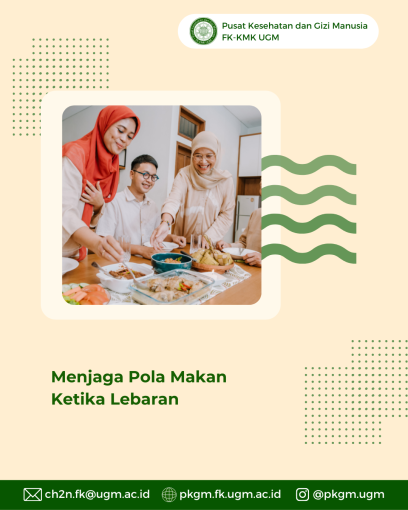
Eid Al-Fitr or Lebaran is a day that is highly awaited by Muslims, not only in Indonesia, but also all around the world. Eid is identical with a family gathering and also the tradition of eating together with family. Many types of food and drinks are served during Eid. In Indonesia, the usual menus are lontong opor ayam, rendang, meatball soup, Eid cakes, snacks, and sweet drinks.
Some people make Eid or Lebaran as a time of revenge to eat as much as they want, after having fast for about 30 days in the month of Ramadan, within 13-14 hours every day. However, this phenomenon cannot be justified. Why? Because it can cause an unfavorable impact for the body, for example: increasing weight drastically, and also increasing blood sugar and cholesterol levels in our bodies.
There are four tips for maintaining a healthy diet that we need to consider and apply during Eid:
- Limit the Amount of Food Intake and Limit High Calorie Food: Foods Containing Coconut Milk and High in Fat
During Eid, we often feel like we want to taste all the food that is served at the table. It is okay to try all the foods served, but remember to limit the number of the portions. Use small plates to limit the amount of your food intake.
Most of the food served during Eid are identical with coconut milk (santan) and rich in fat. Even though it has such a delicious taste, but we need to limit the portions. If it’s too much consumed, there can be an increase in body weight, cholesterol and blood sugar levels, so that it can increase the risk of cardiovascular disease (1).
- Increase the Consumption of Vegetables and Fruits
Try to keep consuming vegetables and fruits during Eid. Besides choosing protein-rich foods, don’t forget to tuck in vegetables and fruits on your plate, to meet your micronutrient needs. The World Health Organization (WHO) recommends consuming vegetables and fruits at least 400 grams/person/day (2).
Vegetables and fruit are known to be rich in vitamins, minerals, carotenoids, phytosterols, flavonoids, phenolic compounds, dietary fibers, and antioxidants that have so many benefits for the body (3,4). One of the benefits is that it can maintain our health and also reduce the risks of several diseases (3), such as:
- Cancer
- Cardiovascular diseases: hypertension and chronic health failure
- Diabetes Mellitus
- Arthritis
- Skin diseases
- Overweight and Obesity
- Neurodegenerative diseases: Alzheimer’s and Parkinson’s disease
In addition, consuming enough vegetables and fruits also helps maintain lung function in adults, and also increases bone health to avoid the risk of osteoporosis (3).
- Limit Sugar Intake
Oftentimes, sweet foods and drinks are served during Eid. It’s okay if you want to try various types of Eid cakes or sweet drinks served on the table, but keep an eye on the numbers of the portions. Eating too much sugar increases the risk of dental caries, diabetes, and obesity (5).
Don’t forget to drink enough water after consuming sweet foods and drinks. The Ministry of Health Republic of Indonesia recommends drinking 2 liters of water or 8 glasses every day (6).
- Do Moderate Exercise
Last but not least, take your time to do some exercises. The Ministry of Health Republic of Indonesia recommends exercising for about 30 minutes/day or 150 minutes/week in moderate intensity (7). You don’t have to do sports using special equipment or go to the gym with a personal trainer, but you can do your exercises independently at home. Choose a type of exercise that you can enjoy, so that you don’t feel overwhelmed while doing it.
References:
- Astrup A, Mangkos F, Bier DM, Brenna T, Otto M, Hill JO, et al. Saturated Fats and Health: A Reassessment and Proposal for Food-Based Recommendations. JACC State-of-the-Art Review. 2020; 76(7).
- WHO. Healthy Diet. [Online]; 2020 [cited 2022 April 23. Available from: https://www.who.int/news-room/fact-sheets/detail/healthy-diet.
- Yahia EM, García-Solís P, Celis MEM. Contribution of Fruits and Vegetables to Human Nutrition and Health. In Postharvest Physiology and Biochemistry of Fruits and Vegetables. Cambridge: Woodhead Publishing; 2019. p. 19-45.
- Varadaraju R, Patel P. Health Benefits of Vegetables. International Journal of Chemical Studies. 2019; 7(2): p. 82-87.
- WHO. Taxes on sugary drinks: Why do it? (No. WHO/NMH/PND/16.5 Rev. 1): World Health Organization; 2017.
- Kemenkes RI. Berapa Takaran Normal Air Agar Tidak Kekurangan Cairan dalam Tubuh? [Online]; 2018 [cited 2022 April 23. Available from: http://p2ptm.kemkes.go.id/preview/infografhic/berapa-takaran-normal-air-agar-tidak-kekurangan-cairan-dalam-tubuh.
- Kemenkes RI. Ayo Bergerak, Lawan Obesitas Jakarta: Kementerian Kesehatan RI; 2017.
